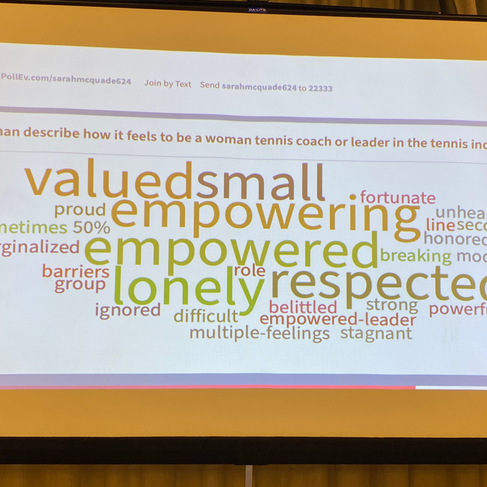The Professional Tennis Registry (PTR) under their PTRW umbrella have a Because We Can pathway dedicated exclusively to support, educate and provide resources for women coaches.
e.t.c coaching consultants (Linda Low and Sarah McQuade) have been thrilled to partner with Milena Vidos Director of Education and Diversity at the PTR to create a new workshop sitting in the PTRW pathway titled Because We Need Change which is designed to help Coaches, Head Coaches, Directors of Coaching and Rackets and Tennis Leaders address the gender inequities that exist in tennis from the court to the C-suite.

The workshop design leaned heavily on the research conducted by the Tucker Center which acknowledges that:
Women are often statistic tokens (>20% of staff) which mean they will more frequently experience negative workplace and psychosocial outcomes associated with being in the minority such as discrimination, scrutiny, wage inequality stress, less job satisfaction, solution and pressure to perform.'
Linda and Sarah have extensive expertise in women's coach and leadership development having been involved in the Olympic Solidarity funded WISH Pathway (Women into Sports High Performance) and the Commonwealth Women's Leadership Program as mentors and Project Directors. They were able to leverage this expertise to create a workshop running high on awareness-raising, engagement, interaction, networking and solution focused thinking.
Over 50 PTR coaches from various coaching spaces and places including but not limited to parks and recreation, private training providers, high school and Collegiate joined with PTR and USTA staff from across the sections and from USTA National and were challenged to:
Consider how well women are represented globally across sport and nationally within tennis
Examine their own bias and consider what they can do to evolve their own perceptions and actions
Analyze the barriers that exist for women entering and progressing within tennis
Identify what they could do to drive change locally
One of the most revealing aspects of the workshop was when the women and men in the room were asked independently to describe how it feels to be a coach or leader in tennis.
The responses offered by the men reflected mostly positive feelings. The women in the room by contrast reflected contradictory, almost polar opposite feelings.
The workshop drew heavily on experiences from the coaches, counter balanced these with research based evidence and asked coaches to identify what they could actually do from their vantage point to drive change for women in tennis.
It was acknowledged that change might not happen for women overnight but that if each one of us could assume responsibility to drive change locally then every local action initiative when combined within another will result in a wave of change across the country.













Comments